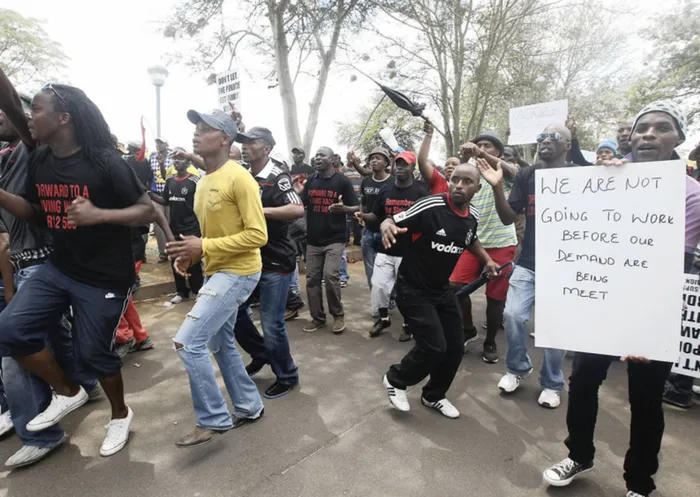Extra cash for miners who go to work

28/10/12 Police used rubber bullets and teargas to separate clashing groups, Cosatu-affiliated unions planned to meet at the stadium for a rally to strengthen the faltering membership of the embatlled NUM at Olympia Park Stadium in Rustenberg North West. (623) Photo: Leon Nicholas 28/10/12 Police used rubber bullets and teargas to separate clashing groups, Cosatu-affiliated unions planned to meet at the stadium for a rally to strengthen the faltering membership of the embatlled NUM at Olympia Park Stadium in Rustenberg North West. (623) Photo: Leon Nicholas
Ultimatums and threats of dismissals saw thousands of workers returning to work in the gold and platinum sectors last week, possibly bringing to an end industrial unrest that has seen the country’s credit ratings slashed and the rand tumble.
Even so, it will be some time before production is up to speed since the operations need to be made secure after having been idle for weeks on end.
On Saturday, Anglo American Platinum said it had backed down on its decision to fire 12 000 employees from its Rustenburg operations. It also gave employees from its Union and Amandelbult mines in Limpopo a final warning to return to work tomorrow.
All its workers were required to return to work tomorrow after an agreement between unions, the strike committee and management.
As part of the agreement, workers were offered a R2 000 “hardship allowance” after tax, as a buffer after five weeks of no wages. The offer will be subject to a successful full shift 48 hours after returning to work tomorrow.
Employees who did not go on strike will be awarded a R2 000 loyalty allowance. Employees who have been affected by the no-work, no-pay policy have an option to apply for a R2 500 cash advance which is payable over six months starting from January. It said employees who did not return to work would not qualify and would remain dismissed. Disciplinary action will be taken against them.
“The offer provides a sound basis for employees to return to work and for the company to return to full operation, while maintaining our current wage agreement and negotiating structure. We hope that our employees will use this opportunity to return to work,” chief executive Chris Griffith said in a statement on Saturday.
In the year to August, mining output fell 3.3 percent, with production of platinum group metals dropping 15.3 percent.
National Union of Mineworkers spokesman Lesiba Seshoka said the offer would relieve both workers and the company from the financial constraints associated with the strike.
Police fired rubber bullets at a crowd blocking a stadium in Rustenburg where a Cosatu rally – called to “retake” the area – was held on Saturday.
As companies counted the cost, about 500 striking employees and protesters were reported to have been arrested in North West, Limpopo and the Free State since August, the National Strike Committee said on Friday.
Of the 500, about 200 were arrested on August 16 when 34 people were killed at Lonmin during a clash with police, while 40 people were arrested at Kumba Iron Ore’s Sishen mine.
Most of AngloGold Ashanti’s 12 000 workers who had been on strike at its operations reported for duty on Friday after unions and management struck a wage deal to improve salaries in the gold sector.
According to the deal, entry-level employees were regraded upwards and their salaries were increased by between 1.5 percent and 2 percent.
A spokesman for AngloGold Ashanti said the dismissal process would continue for those who failed to return to work. AngloGold lost about 32 000 ounces of production for each of the six weeks that its mines were idle.
The company will provide details on the impact of the strike, the settlement and the ramp-up process along with the company’s operating and financial results on November 8.
Harmony Gold said that of 5 400 workers who went on strike, 98 percent were on duty.
Gold Fields said hearings for the dismissed employees started on Thursday.